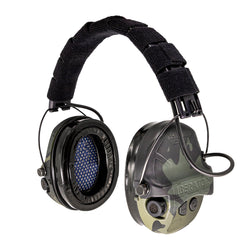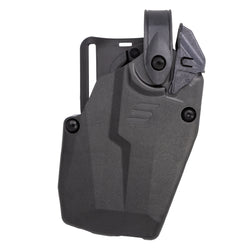Water is life’s unsung hero, quietly powering every breath, step, and heartbeat. But what happens when your body doesn’t get enough of it? Dehydration can creep in unnoticed, turning your body’s finely tuned machinery into a sputtering engine. Whether you’re battling the summer heat, pushing through a workout, or recovering from illness, staying hydrated is more than a health tip—it’s a lifeline.
Dehydration happens when your body loses more fluids than it takes in. It’s not just about quenching your thirst—dehydration can sneak up on you, leading to serious health risks, especially in hot climates or during intense physical activities.
Staying hydrated is not just about comfort—it’s critical for maintaining peak performance and situational awareness. Whether you’re on duty, at the range, training under the sun, or gearing up for drills, dehydration can severely compromise reaction times, decision-making, and endurance.
Keep hydration accessible with water bottles or hydration packs and take regular sips—even mild dehydration can impact your ability to perform effectively. Don’t wait until thirst sets in—preemptively replenishing fluids is the key to staying sharp and prepared in every scenario.

SIG SAUER ACADEMY)
Why Hydration Is Key
Water is life. Every single cell in your body relies on it to function. Staying hydrated helps regulate your body temperature, lubricate your joints, transport nutrients, and flush out waste. Without enough water, these critical processes slow down, and your body struggles to keep up.
Dehydration doesn’t just leave you parched—it can take a serious toll on your mental and physical performance. When your body lacks sufficient water, your brain, which is made up of about 75% water, struggles to function at its peak. This can result in difficulty concentrating, slower reaction times, and impaired memory. On the physical side, dehydration drains your energy, reduces endurance, and causes muscle cramps, making even routine tasks feel like climbing a mountain.
Staying hydrated is the secret weapon that keeps your mind sharp and your body strong. Don’t underestimate the power of a glass of water—it might just be what stands between you and your best performance!

Spotting the Warning Signs of Dehydration
Dehydration often starts with subtle signals, quietly alerting you that your body needs more fluids. Early warning signs include thirst, dry mouth, and fatigue—symptoms that are easy to overlook in the hustle of daily life.
If dehydration goes unaddressed, it can progress into serious complications. Symptoms like dizziness, rapid heartbeat, sunken eyes, lack of sweating, muscle cramps, and low blood pressure may appear. In severe cases, dehydration can lead to fever, confusion, and even unconsciousness. These advanced symptoms are medical emergencies and require immediate attention to prevent potentially life-threatening outcomes.

When Are You Most at Risk?
Dehydration doesn’t play favorites, but certain situations put you in the spotlight:
- Scorching Heat: Sweating more in high temperatures leads to rapid fluid loss.
- Intense Workouts: Physical exertion pushes your hydration limits.
- Illness: Fever, vomiting, or diarrhea can drain fluids quickly.
- Age Matters: Kids and older adults are more vulnerable to dehydration.
The Hidden Dangers
Unchecked dehydration can take a dangerous turn:
- Heat-Related Illnesses: Without adequate hydration, the body struggles to regulate temperature, increasing the risk of heat cramps, exhaustion, or even heatstroke.
- Kidney Trouble: Dehydration reduces urine output, which can lead to urinary tract infections (UTIs) and kidney stones. Severe dehydration may even cause kidney failure.
- Electrolyte Imbalances: Electrolytes like sodium and potassium are crucial for bodily functions. Dehydration can disrupt their balance, potentially causing seizures or heart issues.
- Shock: Known as hypovolemic shock, this occurs when low blood volume leads to a dangerous drop in blood pressure, impairing oxygen delivery to vital organs.
Staying hydrated is essential for preventing these complications.

Debunking the Myths
Dehydration myths often misguide us. Here’s the truth:
- Feeling thirsty doesn’t always mean you’re dehydrated, but it’s your body’s way of signaling a need for fluids.
- Dark urine isn’t always dehydration—it can also be influenced by diet or supplements.
- Yes, you can drink too much water! Overhydration might dilute sodium levels, causing hyponatremia.
- Sports drinks aren’t always the best choice—be wary of added sugars.
- Caffeine in moderation? Totally fine—it contributes to your fluid intake.
- Extra water won’t speed up toxin removal, contrary to popular belief.
- Cold climates won’t save you; dehydration can happen anywhere.

Hydration’s Secret Weapon: Electrolytes
Water is essential for hydration, but it’s not the whole story—electrolytes are critical for maintaining the balance your body needs to function effectively. These vital minerals, including sodium, potassium, magnesium, calcium, and chloride, are indispensable for fluid regulation, muscle contractions, nerve signaling, and stabilizing blood pressure.
When your body loses fluids through sweat, exertion, or heat exposure, it also loses electrolytes. If these aren’t replenished alongside water intake, you may encounter dehydration-related issues like muscle cramps, fatigue, and in severe cases, electrolyte imbalances such as hyponatremia.
To stay properly hydrated, it’s important to maintain a balance of both water and electrolytes, especially during prolonged physical activity or extreme heat.
Top Natural Electrolyte Sources:
- Sodium: Table salt, broths, and pickled foods.
- Potassium: Bananas, oranges, spinach, sweet potatoes.
- Calcium: Dairy products, fortified plant-based milks, and leafy greens like kale.
- Magnesium: Nuts, seeds, whole grains, and legumes.
- Chloride: Table salt, seaweed, and processed foods (in moderation).
Where Do Sports Drinks Fit In?
Sports drinks can be useful in certain situations, like intense exercise or prolonged physical activity. They’re specifically designed to replenish both fluids and electrolytes lost through sweat, making them a practical option for athletes or those engaging in high-intensity workouts.
However, many sports drinks contain added sugars and unnecessary calories, which might not suit everyone, especially for casual hydration. Non-athletes or those with moderate activity levels may find that water paired with natural electrolyte-rich foods is often sufficient to meet their needs.

Although water and electrolyte-rich foods are generally sufficient, sports drinks can be useful in intense exercise or prolonged physical activity. (Photo: Wikimedia / CC BY-SA 3.0)
Hydration Guidelines Tailored for You
The classic “8×8 rule”—drinking eight 8-ounce glasses of water daily—serves as a helpful starting point, but hydration is not one-size-fits-all. Your water needs depend on multiple factors, and tailoring your intake to your lifestyle can make all the difference.
- Your Activity Level: Engaging in vigorous physical activities? Your body demands more fluids to replace what’s lost through sweat. Light daily tasks? Stick to the basics with regular water consumption.
- Your Environment: Hot, humid weather or high altitudes can accelerate fluid loss, calling for extra hydration and a boost of electrolytes.
- Your Personal Needs: Age, health, diet, and even body weight play a role in determining how much water is right for you.
A smarter approach is to listen to your body. Thirst is a natural guide but also watch for physical signs—like clear or light-yellow urine—that indicate you’re staying hydrated. If you’re sweating heavily or engaging in intense activities, consider supplementing with electrolytes for optimal balance.
No matter your circumstances, staying hydrated is essential for peak performance and well-being. Adapt your water intake based on what your body truly needs, and you’ll always be a step ahead. CamelBak has a helpful hydration calculator on its website to help determine how much water you need for maximum performance.
The Bottom Line
Hydration is more than just drinking water—it’s about giving your body what it needs to thrive. By busting myths, embracing electrolytes, and adjusting your hydration habits, you can protect your health and keep dehydration at bay, no matter the challenge.









